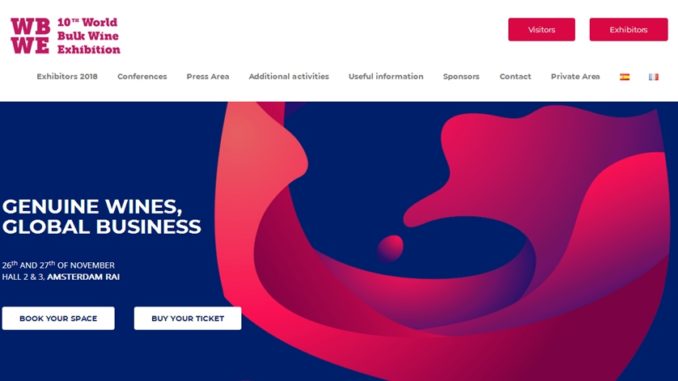
By Jim Boyce | Say “bulk wine” and people instantly think quantity over quality. But there’s far more to it, says Jörg Philipp, who will help World Bulk Wine Exhibition (WBWE) organize its first show in China, and 11th overall, on May 30 and 31 in Yantai, Shandong, a province whose ports have seen no shortage of wine pass through. I talked to Phillip, the WBWE rep for China, about the event and bulk wine in general.

Grape Wall: Why China now? And where does it rank as a bulk wine player?
Jörg Philipp: The process to go to China was a long one. It took two years of research and preparation to finally make a decision. The market there is important and changing fast and we want to make it easier for buyers in China to access bulk wine. China ranks number five now and will soon rank in the top three as a bulk wine importer.
People often equate bulk with low quality or at least with wine that producers deem unworthy to bottle. Does perception match reality?
Bulk wine was a hidden business until ten years ago, with agents, big buyers and brands ruling. Things started changing about five years ago. As the market became more transparent, bulk wine had to increase in quality. To make bulk wine itself is in many cases a specialization and this separates production from distribution.
This also says nothing of quality. Bulk wine producers sometimes have less wine to sell than many big famous wineries. It is true that if buyers are looking for entry wines, they will receive varying qualities. But an interesting trend now is high quality bulk wine. That is evidence the market for own brands and private labels is booming.
One irony in China is local wines are winning many medals and kudos but losing market share to imports, including bulk. How to explain why bulk wine maintains such appeal in China?
Bulk wine often provides the flexibility in quality and price that clients seek. This means today wines from Chile are interesting and tomorrow from Spain. Harvests vary around the world every year.
With respect to China I see the price level as a difficult challenge. Even within China, wine transport is long and expensive, while most of the big players buying bulk wine are near ports and can easily receive cost efficient wine by ship.
Shipping wine in bulk has benefits like maintaining consistency and lowering transport costs and carbon footprints. To what degree are these considerations for buyers?
If bulk wine is handled in a proper way the flavor will stay consistent, as from production to the bottling point there is no air impact. For places with a high awareness of environmental impact, such as Switzerland, Germany and Scandinavian, the low carbon footprint is very important.
For many buyers the cost point is more important, especially if you can also get better prices for bottles, labels and closures at the destination. You also save money because you move less weight and volume.
How will the WBWE in China differ from past exhibitions?
WBWE China will start from scratch. Neither the market nor the business habits are comparable with the other WBWE editions, including the upcoming one in Amsterdam. That means it will be an enormous challenge for the team in China. We will make a unique exhibition, using the professional knowledge we have gained during 10 years in Europe and in respect to Chinese culture.
I’ll have more about WBWE and other bulk wine news shortly!
Grape Wall has no sponsors of advertisers: if you find the content and projects like World Marselan Day worthwhile, please help cover the costs via PayPal, WeChat or Alipay.
Sign up for the free Grape Wall newsletter here. Follow Grape Wall on LinkedIn, Instagram, Facebook and Twitter. And contact Grape Wall via grapewallofchina (at) gmail.com.

Leave a Reply
You must be logged in to post a comment.